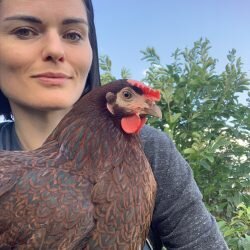So Many Chicks
There has been a lot of news coverage over the last couple of weeks including in the New York Times and NPR about an increase in people buying baby chickens to raise them in their backyards, presumably for their eggs.
People are learning the wrong lesson. Now is not the time to start farming animals in your backyard as a response to food insecurity and more time at home during quarantine.
An Era of Pandemics
We are in the era of global pandemics caused or furthered by animal farming and consumption. It’s facile to look at the wildlife markets and trade in China and be situationally judgmental as Americans don’t eat bats or pangolins. But the global and industrialized farming of chickens has spread strains of avian flu around the globe.
And the threat of a potential avian flu pandemic would be fueled by a more common but equally cruel practice as eating bats– eating chickens and their egg. Whether those poor, vulnerable birds are in large scale farms, small farms, or backyard coops.
The Cruelty of Backyard Chicken Raising
That last paragraph might have stopped most readers. “Cruel, backyard chickens? Eggs?” Yes, the farming of chickens for their eggs is an incredible brutal industry, even in backyards and small farms.
When you purchase baby chicks, the supplier tries to sell you females. But one out of every two chickens born is a male. Those babies are killed right after birth—ground up, gassed, suffocated and crushed. So immediately – by ordering one baby chicken, you have asked for two chickens to be born and the other one to be killed. If you buy ten chicks, you’ve paid for the death of ten others.
That baby hen who arrives at your house (or whom you’ve bought at a farm supply store) is terrified, often sick, and should be with her mother. Instead she never met her mother who is locked in a shed or farm laying egg after egg after egg until she is worn out and is killed.
You are not a mother hen and will likely not do a good job of raising that baby. Many of these babies being bought now will live short lives due to human neglect and ignorance. But if your hen does makes it to adulthood, she will now suffer because her body has been bred to overproduce eggs. Human breeding manipulated her reproductive system so she can lay up to 300 eggs a year instead of the 12-14 annually she would naturally lay as part of her efforts to have babies. This causes great physical pain and harm to her – leading to malnutrition, reproductive issues, and even cancer.
Most people who keep chickens do not treat these health issues. At a sanctuary, we often spend up to a few thousand dollars a year keeping a hen healthy and happy – including specialized vet care and preventative care. No small farms or backyard “farmers” are doing this. Those hens just suffer or die. Chickens are cheap (hey, you can just order some more through the mail), so they are just replaced.
But if the hen makes it through a few years in a backyard coop, her amount of eggs will start slowing. And then eventually she will stop laying eggs. This is when people start calling sanctuaries and rescuers to come and get their “spent” hens if they don’t want to do what farms do which is kill any hen who is no longer young.
Sanctuaries and Rescues Are Full
And we can’t take all these hens. Nor can we take the baby roosters who are being accidentally sold right now because one out of every ten babies is incorrectly sexed. In a few months, all of us rescuers and farm sanctuaries are going to start to get calls from people who want to give us their accidental rooster, their hens they can’t care for, the sick baby they neglected, and then (eventually) their older hens who stop laying and are no longer wanted.
So yes, panicked homesteaders or bored parents who are buying up exploited terrified babies as a new hobby — we are learning the wrong lesson from this pandemic.
Be kind, live small, stop exploiting animals and risking a future with even more deadly zoonotic pandemics. We need to stop consuming animals; not moving the disease risk and cruelty into our backyards.
Plant a garden.
Visit Considertheegg.org
For the Animals,
Rachel McCrystal
Executive Director




